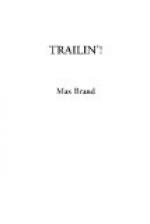“He knows,” muttered Lawlor.
“Hell! Then it’s all up?”
“No; keep bluffin’; wait. How’s everything?”
“Gregory ain’t come in, but Drew may put him wise before he gets inside the house.”
“You done all I could expect,” said Lawlor aloud as Bard came up, “but to-morrow go back on the same job and try to get something definite.”
To Bard: “Here’s your place, partner. Just been tellin’ Duffy, there on your right, about some work. Some of the doggies have been rustled lately and we’re on their trail.”
They took their places, and Bard surveyed the room carefully, as an actor who stands in the wings and surveys the stage on which he is soon to step and play a great part; for in Anthony there was a gathering sense of impending disaster and action. What he saw was a long, low apartment, the bare rafters overhead browned by the kitchen smoke, which even now was rolling in from the wide door at the end of the room—the thick, oily smoke of burnt meat mingled with steam and the nameless vapours of a great oven.
There was no semblance of a decoration on the walls; the boards were not even painted. It was strictly a place for use, not pleasure. The food itself which Shorty Kilrain and Calamity Ben now brought on was distinctly utilitarian rather than appetizing. The piece de resistance was a monstrous platter heaped high with beefsteak, not the inviting meat of a restaurant in a civilized city, but thin, brown slabs, fried dry throughout. The real nourishment was in the gravy in which the steak swam. In a dish of even more amazing proportions was a vast heap of potatoes boiled with their jackets on. Lawlor commenced loading the stack of plates before him, each with a slab and a potato or two.
Meantime from a umber of big coffee pots a stream of a liquid, bitter as lye and black as night, was poured into the tin cups. Yet the cattlemen about the table settled themselves for the meal with a pleasant expectation fully equal to that of the most seasoned gourmand in a Manhattan restaurant.
The peculiar cowboy’s squint—a frowning of the brow and a compression of the thin lips—relaxed. That frown came from the steady effort to shade the eyes from the white-hot sunlight; the compression of the lips was due to a determination to admit none of the air, laden with alkali dust, except through the nostrils. It grew in time into a perpetual grimace, so that the expression of an old range rider is that of a man steeling himself to pass through some grim ordeal.
Now as they relaxed, Anthony perceived first of all that most of the grimness passed away from the narrowed eyes and they lighted instead with good-humoured banter, though of a weary nature. One by one, they cast off ten years of age; the lines rubbed out; the jaws which had thrust out grew normal; the leaning heads straightened and went back.
They paid not the slightest attention to the newcomer, talking easily among themselves, but Anthony was certain that at least some of them were thinking of him. If they said nothing, their thoughts were the more.




